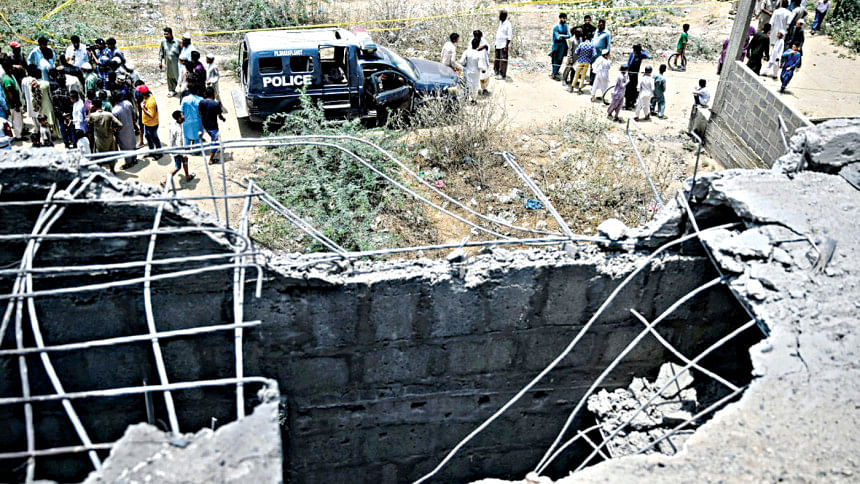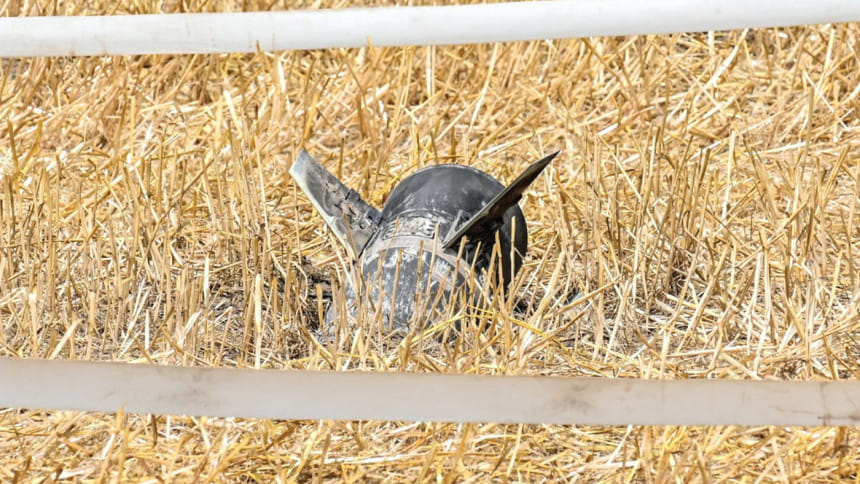Indo-Pak escalation: Rivals trade drones, missiles

- Rubio holds talks with Pakistan PM, Indian FM, urges de-escalation
- Blackout in Indian border areas; schools shut
- India claims 100 terrorists killed in Wednesday's attack
- Pakistan claims killing 40-50 Indian soldiers along LoC
India and Pakistan yesterday accused each other of carrying out waves of attacks using drones and missiles, as deadly confrontations between the nuclear-armed foes raised the fear of escalation.
New Delhi yesterday said Pakistan carried out strikes targeting three Indian military stations in Kashmir with missiles and drones. No casualties were reported.
Pakistani Information Minister Attaullah Tarar denied that his country's military had carried out strikes in Jammu. Pakistan also rejected allegations that it launched attacks on Indian cities of Pathankot, Jaisalmer, and Srinagar.
India said "the threat was neutralised ... with kinetic and non-kinetic means," adding that the bases targeted were in "Jammu, Pathankot and Udhampur in proximity to the international boundary".
Blackouts were reported from a swathe of cities in Kashmir, including Jammu, as well as cities in the neighbouring state of Punjab such as Amritsar and Jalandhar.
"We can hear loud explosions, it feels like bombs are going off everywhere," said Varinder Jeet Singh, a senior member of the Bharatiya Janata Party (BJP), speaking about Jammu.
"There is a complete blackout."
Earlier yesterday, Pakistan said it shot down 25 drones from India, while India said its air defences had stopped Pakistani drone and missile attacks on military targets, dashing hopes they would soon bow to pressure to end their worst confrontation in more than two decades.

World powers from the US to Russia and China have called for calm in one of the world's most dangerous and most populated nuclear flashpoint regions.
Yesterday's reported exchanges came a day after India said it hit nine "terrorist infrastructure" sites in Pakistan in retaliation for what it says was a deadly Islamabad-backed attack in Indian Kashmir on April 22.
Pakistan says it was not involved and denied that any of the sites hit by India were militant bases. It said it shot down five Indian aircraft on Wednesday, a report the Indian embassy in Beijing dismissed as "misinformation".
However, two US officials yesterday told Reuters that a top Chinese-made Pakistani fighter plane shot down at least two Indian military aircraft on Wednesday.
One US official, speaking on condition of anonymity, said there was high confidence that Pakistan had used the Chinese-made J-10 aircraft to launch air-to-air missiles against Indian fighter jets -- bringing down at least two.
According to another official, at least one of them was a French-made Rafale fighter aircraft.
The escalation came after Pakistan's Defence Minister Khawaja Muhammad Asif, in an interview with Reuters, said Pakistani retaliation "is increasingly becoming certain now" after Wednesday's Indian missile attacks.
"I will still refrain from saying it is 100 percent. But the situation has become very difficult. We have to respond," he added.
Earlier, Indian Foreign Minister Subrahmanyam Jaishankar said New Delhi did not intend to escalate the situation.
"However, if there are military attacks on us, there should be no doubt that it will be met with a very, very firm response," he said at an India-Iran Joint Commission Meeting.
Before yesterday's attacks, analysts said there were signs that the conflict may not escalate. However, the drone attacks by India and Pakistan's retaliation have put that hope in doubt.
Pakistan's Foreign Minister Ishaq Dar yesterday told Reuters that there have been contacts between the offices of the national security advisers of the two countries, and the hotline between their heads of military operations was also working. He did not give more details.
His comment came a day after Khawaja Asif told the New York Times that Pakistan reserved the right to strike if India mounted further attacks but was ready to de-escalate.
Amid the rising tensions, US Secretary of State Marco Rubio yesterday urged de-escalation and expressed support for direct dialogue in separate calls with Jaishankar and Pakistan PM Shehbaz Sharif.
To Jaishankar, Rubio reaffirmed his commitment to work with India in the fight against terrorism. He expressed sorrow to Sharif for the reported loss of civilian lives in the current conflict between the two neighbouring countries, while also urging Pakistan to take steps to end support for terrorist groups.
The relationship between India and Pakistan has been fraught with tension since they gained independence from colonial Britain in 1947. The countries have fought three wars, two of them over Kashmir, and clashed many times.
The countries that both claim Kashmir in full and rule over parts of it separately acquired nuclear weapons in the 1990s.
Pakistan military spokesperson Ahmed Sharif Chaudhry said Pakistan early yesterday shot down 25 Israeli-made drones from India at multiple locations, including the two largest cities of Karachi and Lahore.
One drone was also shot down over the garrison city of Rawalpindi, home to the Pakistan army's heavily fortified headquarters, he added.
One drone hit a military target near Lahore, and four personnel of the Pakistan army were injured in the attack, Chaudhry said.
The Indian defence ministry, in a statement, said Pakistan attempted to engage a number of military targets in northern and western India from Wednesday night into yesterday morning, and they were "neutralised" by Indian air defence systems.
In response, Indian forces targeted air defence radars and systems at a number of locations in Pakistan yesterday, the ministry said. The "Indian response has been in the same domain with the same intensity as Pakistan," it added.
The Indian ministry accused Pakistan of increasing the intensity of its firing across the ceasefire line, the de facto border, in Kashmir. Sixteen people, including five children and three women, were killed on the Indian side, the statement said.
Pakistan said at least 31 of its civilians were killed and about 50 wounded in Wednesday's strikes and in cross-border shelling across the frontier.
Yesterday, Indian ministers told a meeting of all political parties in New Delhi that the strikes on Pakistan had killed more than 100 militants and that the count was still ongoing, government sources said.
Pakistan's Information Minister Attaullah Tarar told parliament that Pakistani forces had killed 40-50 Indian soldiers on the de-facto border in Kashmir and had "blown" Indian military installations.
Reuters could not independently verify claims of both countries.
Meanwhile, several Indian states, including Punjab, Bihar, Haryana, Rajasthan and Gujarat, have announced the closure of schools in border areas, enforced blackouts in border districts and cancelled the leave of police personnel and administration officials.

 For all latest news, follow The Daily Star's Google News channel.
For all latest news, follow The Daily Star's Google News channel. 



Comments